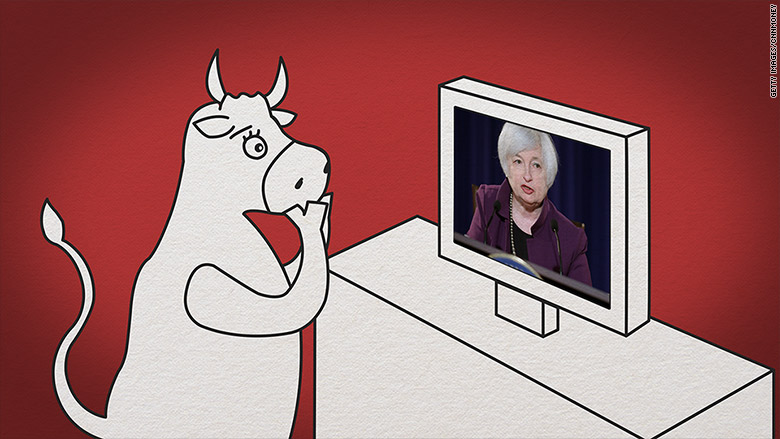
Wall Street threw itself a rate hike party on Wednesday.
U.S. stocks rallied as investors cheered the Federal Reserve's historic decision to raise interest rates for the first time since 2006. The move represents a major vote of confidence in the American economy's recovery from the Great Recession, which caused the Fed to slash rates to zero for the first time ever.
The market gathered momentum after Fed chief Janet Yellen reassured Wall Street during a press conference that the Fed will be very gradual about further rate hikes.
The Dow jumped 224 points, while the S&P 500 and the Nasdaq advanced about 1.5% apiece. The S&P 500 also returned to positive territory on the year.
The sizable gains were a sign that Wall Street was more than ready for the Fed to remove its emergency support. The move also reduces uncertainty about Fed policy.
"The markets are happy because the Fed is telling us the economy is on the right track. We're no longer in crisis mode," said Kristina Hooper, U.S. investment strategist at Allianz Global Investors.
Yellen said the decision "marks the end of an extraordinary period" of low rates designed to boost the recovery from the Great Recession.
"The U.S. economy has shown considerable strength," she said.
Related: What a Fed rate hike means for you
It's important to remember that interest rates remain extremely low, even after the rate hike. The Fed raised its key rate from a range of 0% to 0.25% to a range of 0.25% to 0.5%.
Yellen soothed concerns about higher rates by repeatedly telling investors on Wednesday that the Fed will be "gradual" about future rate increases so as not to kill the economic recovery.
The rate hike also eases fears that the Fed was trapped at near-zero rates and would never be able to lift them without causing economic and financial chaos.
"Very rarely (if ever) have central banks successfully exited the zero bound and quantitative easing; we believe today's U.S. Federal Reserve will ultimately prove the first to do so," Joseph Davis, Vanguard's global chief economist, wrote in a note.
Banks cheered the rate hike the loudest, with Citigroup (C), Bank of America (BAC) and Goldman Sachs (GS) rallying 2% each. That's because higher rates will make it easier for banks to charge borrowers more. Almost immediately several big banks like JPMorgan Chase (JPM) announced plans to raise the cost of loans but keep deposit rates the same.
But recent junk bond freakout is still a worry
Stocks are also getting an assist on Wednesday from the junk bond market, which is rebounding after a recent scare. Exchange-traded funds that track the high-yield market, including the SPDR Barclays High Yield Bond ETF (JNK), rose solidly on Wednesday.
Oil's recent volatility also looms large
The junk bond fears are exacerbated by the crash in oil prices, which has caused a wave of energy defaults. Oil plunged nearly 5% on Wednesday to settle at $35.52 a barrel.
Junk bond concerns have also risen following the implosion of a mutual fund run by Third Avenue that invested in risky distressed debt.
Bonds prepare for higher yields
The far safer market for U.S. government debt is also responding to the Fed decision. The yield on the 10-year Treasury note, the benchmark rate for debt, rose to 2.39%, compared with 2.27% the day before.
Shorter-duration bonds are more likely to experience a jolt from a rate hike. The one-month Treasury-bill yield rose to 0.22%, its highest level since 2009.
Will dollar strengthen even more?
After a terrific 2015, the U.S. dollar didn't move much after the Fed decision. The euro was changing hands at about $1.09. That's a dramatic decline from $1.25 a year ago, but better than $1.06 just last month.
The relatively strong U.S. economy along with the anticipation of higher interest rates has allowed the dollar to strengthen significantly against rival currencies this year. The question is: will the dollar keep gaining against other currencies once rates go higher?


